Get The Healthy Child Guide TODAY!

Bringing a new life into the world is a remarkable journey, and proper nutrition plays a crucial role in ensuring a healthy pregnancy. Among the many nutrients required during this period, stands out as a star player. In this blog, we’ll explore why folate is essential for expectant mothers and their developing babies and how to incorporate it into your diet.
The Folate Debate
Folic acid is a type of folate that is most commonly used in vitamin supplements and is used to fortify our foods. However, folic acid is the synthetic, oxidized form of folate. Natural folates that are derived from food are called reduced forms of folate which are readily bioactive. Research has shown that not all women can efficiently metabolize folic acid into a usable form of a bioactive folate. This metabolic difference makes it crucial for pregnant women to focus on consuming folate-rich foods to support the health of their developing baby.
The Crucial Role of Folate in Pregnancy
Folate plays a critical role in pregnancy for several reasons:
- Prevention of Neural Tube Defects: Perhaps the most well-known benefit of folate is its role in preventing neural tube defects (NTDs) in the developing baby. Adequate folate intake during early pregnancy is essential to ensure the proper closure of the neural tube, which forms the baby’s brain and spinal cord.
- Cell Division and Growth: Folate is necessary for DNA synthesis and cell division, which are crucial processes during pregnancy when the baby’s cells are rapidly multiplying.
- Red Blood Cell Production: Folate supports the production of red blood cells, helping to prevent anemia, a common concern during pregnancy.
- Increases likelihood of neurological health of the baby because of antioxidant protection: Folate also has antioxidant properties, helping to reduce oxidative stress. High levels of oxidative stress during pregnancy can be detrimental to the developing fetal brain and may increase the risk of neurodevelopmental issues.
Folate-Rich Foods to Include in Your Diet
Now that we understand the significance of folate during pregnancy, let’s explore some natural sources of this essential nutrient:
- Organic Dark Green Leafy Vegetables: Turnip greens, spinach, romaine lettuce, asparagus, Brussels sprouts, and broccoli are all packed with folate. Incorporate them into salads, stir-fries, or smoothies for a nutrient boost.
- Organic Beans: Whether it’s black beans, pinto beans, or lentils, legumes are an excellent source of folate and provide much-needed protein and fiber.
- Organic Nuts and Seeds: Peanuts and sunflower seeds contain folate, making them ideal snacks or additions to salads and yogurt.
- Organic Fresh Fruits and Juices: Citrus fruits like oranges and grapefruits, as well as their juices, are rich in folate. Berries, avocados, and bananas also provide this essential nutrient.
- Organic Whole Grains: Opt for whole grains like brown rice, whole wheat bread, and oatmeal to increase your folate intake.
- Liver: Liver, particularly from grass-fed animals, is a potent source of folate. However, it’s important to consume it in moderation due to its high vitamin A content.
- Low mercury Aquatic Foods: Certain seafood, such as salmon, trout, and tuna, contain folate. Ensure you choose low-mercury options and cook them thoroughly.
Choosing the Right Prenatal Vitamin
While a balanced diet rich in folate-rich foods is ideal, it’s also a good idea to take a prenatal vitamin to ensure you’re getting all the necessary nutrients. When selecting a prenatal vitamin, make sure it contains a natural bioactive form of folate rather than folic acid. Look for “5-MTHF” or “L-methylfolate” or “folinic acid” on the label, as these are the active forms of folate that can be readily used by your body.
In conclusion, folate is a vital nutrient for a healthy pregnancy, supporting the growth and development of your baby. By focusing on folate-rich foods and choosing the right prenatal vitamin, you can provide your baby with the best possible start in life. Remember, a well-nourished body leads to a healthier, happier pregnancy and a brighter future for your little one.
Learn even more about the optimal prenatal supplements needed in pregnancy and how to select a prenatal vitamin that is right for you.
-
- Attendees will have access to watch each session completely free as it airs or viewers can upgrade to the VIP All-Access Pass for lifetime access.
- This interactive event also includes a Q&A section with opportunities to the ask the experts your personal questions so that your experience is completely tailored to the concerns that matter most to you.
- Questions? Visit www.healthypregnancysummit.com to learn more.
